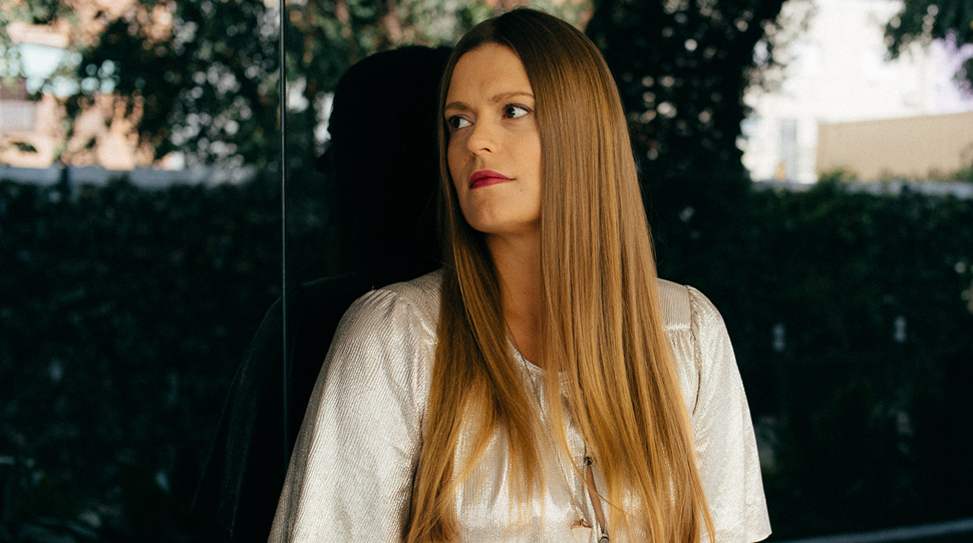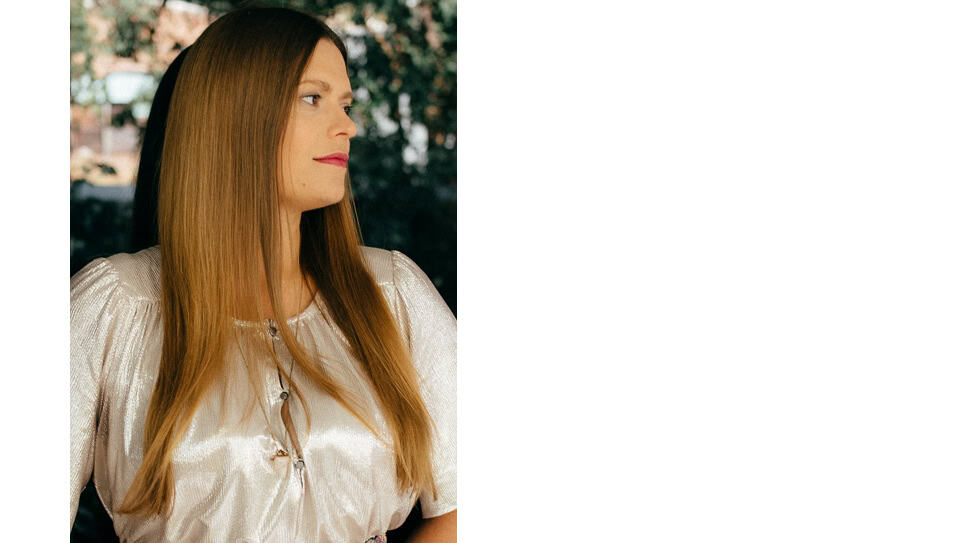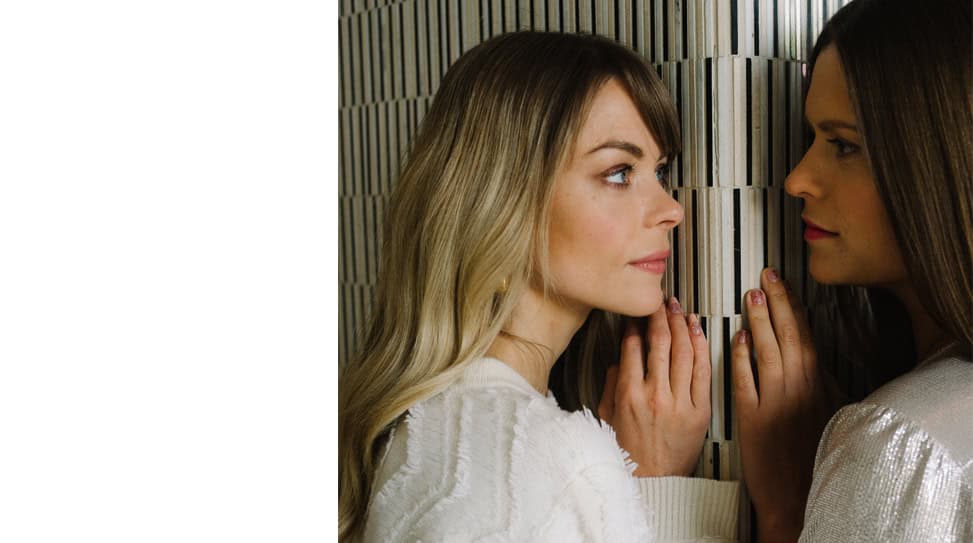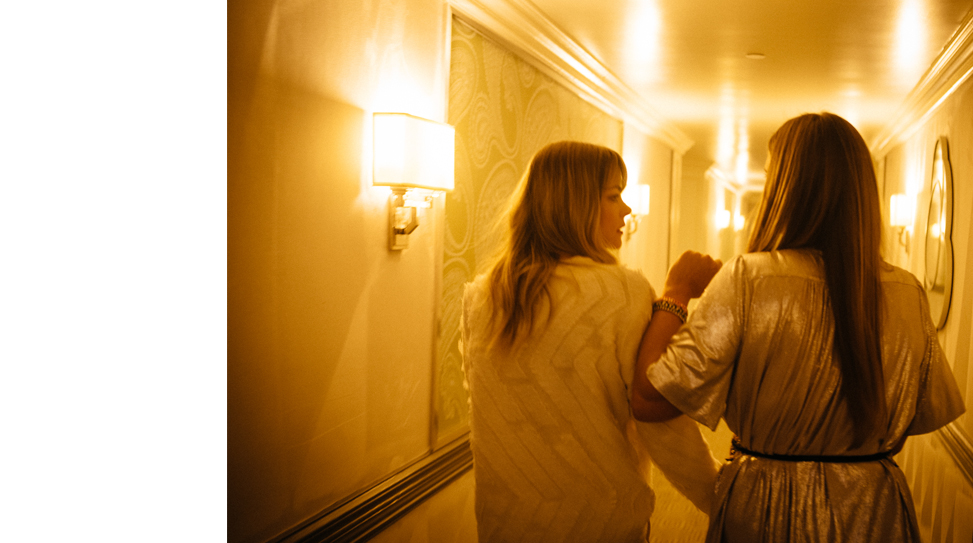I'm not present for a film unless it has a sense of humor about it, even if it's tragic. I find life hilarious.
Perhaps you recognize Marianna Palka from Netflix’s acclaimed ’80s-set comedy series GLOW, which chronicles a start-up group of female wrestlers in Los Angeles. The Scottish actress is also an accomplished writer and director whose first feature, Good Dick, world premiered in the U.S. Dramatic Competition at the Sundance Film Festival in 2008. Bitch marks her fourth feature film.
A rather left-of-field, metaphoric concept, it’s likely that many viewers will be quick to anatomize Bitch—that’s both “bitch” as in a female dog and a pejorative to describe an assertive woman—through a feminist lens. Inspired by a real-life case study by unorthodox psychiatrist R.D. Laing, who once described insanity as “a perfectly rational response to an insane world,” Palka steps into the role of Jill, a housewife-turned-rabid canine. Continually dismissed by her solipsistic and unfeeling husband Bill (Jason Ritter), who’s carrying on an affair with his underling at the office, Jill is left to manage their four children alone. Her artistic dreams on hold indefinitely and after her failed suicide by hanging, Jill spirals downward—into the basement, to be exact—snarling naked in her own feces. Doctors conclude that she needs, as Bill puts it, “the crazy house.” When Bill categorically rejects the idea, it signals far-reaching consequences for the family, including Jill’s sister Beth (Jaime King), who hits pause on her own life to put a cork in this dogged predicament.
Anthem sat down with Palka in West Hollywood to discuss the inspirations behind Bitch, steering films with her close friends, and the indispensable power of believing in your own artistic abilities.
Bitch opens in select theaters on November 10.
[Editor’s Note: This is a companion piece to our Q&A with Palka’s co-star Jason Ritter.]
I had a chance to speak with Jason [Ritter] about Bitch over the summer and one of the things that we discussed was how we’re all capable of turning into anyone—Bill, Jill, Beth—given the right combination of circumstances and life experiences. The film really explores how we’re all affected and have a role to play when one individual that we love loses their footing in a family dynamic. What was inspiring you when you first sat down to write this?
I had done a lot of meditation and lots of craniosacral therapy. If you do it for a long time, you can feel your cranial rhythm as it’s called. It basically involves your body moving in a way that’s really organic and natural to your body. It’s really not something you do at the gym or, you know, when you go out in public. [Laughs] It’s how a lot of dancers move, using their cranial rhythm. So I was really excited to connect physically to what that feeling is: just being wild in your body, which is a genuine kind of wildness, unlike Girls Gone Wild. It’s like, “What is an actual ‘wild person’? What does freedom look like in the body?” I wanted to explore that with Jill because there are so many amazing aspects to being an actor, in the sense that you get liberated in these ways that you’re not allowed to do stuff [normally]. With the things we do on the stage, like screaming or yelling or whatever, you can really let stuff go. Also, in the wrestling ring, for example, you do things you don’t really do in society. I think it’s very helpful and cathartic to watch films or be a part of storytelling in a way that shows these ways of using the body. So that’s something I got excited about: The uniqueness of Jill and the fact that she’s going through something so physical.
Wow, that’s so specific. That was really the catalyst for wanting to make this movie?
Yeah, that’s really where it started. It was my desire to do something like that as an actress that’s not in line with maybe, you know, what you’re “supposed to do” or what you “should do.” It was really freeing. I always like to do stuff that feels like it’s really healing. If it’s healing me or healing something in me physically, then I feel like it’s going to heal other people, too. There’s real alchemy that seems to be bringing some dark into the light. Most of my films are about alchemy.
How did you stumble onto R.D. Laing and his case study that apparently also inspired Bitch?
There are so many amazing books about him in Scotland. If you go to any Scottish library, it will have books on his work, which is all about listening to the patient and being there with an open mind. His approach is not being cerebral and just listening with your whole being to whatever’s going on with the other person. He was never judgmental of his “mental patients.” I mean, I don’t think he even used those words—ever. He never boxed people into a corner. He never tried to put his ideas on them. He just listened to why they might feel a certain way, and because he listened to them, things got better [for his patients]. So he was very successful in that way, because of his approach. I always felt like he had a lot of answers, in terms of how to deal with people who are going through trauma or something that’s happened to them that’s difficult. Jill reacts to a situation; she’s not the problem. She’s just reacting to what the problem is in her environment and in her relationship, which is that she’s being pushed into a corner and not being given any options.
So Jill’s not crazy, but everybody else around her is?
Yeah, and the world! The outside world is much crazier than anything else, I think. If you don’t have great relationships or a way to be supported, it’s very easy to get lost in these ideas that you’re supposed to have these things—a fancy car, a fancy job, a bunch of followers on Instagram—in order to feel like a worthy person. In reality, it’s better to connect with the people around you and see if there’s a way to heal the world or help the world with what you’re doing in your work.
Bitch is your fourth feature since Good Dick. Just to add to what you were saying earlier about alchemy, do you think you have certain proclivities that feel entirely your own and carries through in your body of work in the way of storytelling and the aesthetics?
Speaking of the aesthetics of storytelling, I think I understand the language of cinema in a way that makes me need to make films in a particular way. I think I owe some of that to not having television when I was growing up. The language of cinema is using visuals in a narrative form and using sound to make all of those things work together. It’s a symphony of things together that can really make a difference to the viewer. I’m definitely using the rules of European cinema and the rules of cinema that were utilized in America in the 1970s and earlier. If you use the sound design, the production design and the performances a hundred percent, to the max, the camera listens in a very different way. I think the camera has a different perspective in each of my films because I really turn the volume up on all of that stuff. I think it’s really important to use everything you possibly can as a filmmaker to make the art as understandable as you possibly can to everybody who’s watching it. I take it so seriously! Also, if it’s not funny, I can’t really be there for it. I’m not present for a film unless it has a sense of humor about it, even if it’s tragic. I find life hilarious.
When you’re working on something where you’re not only steering the ship, but going to the most vulnerable places as a fellow actor—breaking down, getting dirty, going nude—is your cast more willing to step outside their own comfort zones? Is that perceptible to you?
I think the innovation of that is always really funny. The reason why that works obviously is, yeah, we’re all jumping off the cliff together. You’re taking those acting risks with them so you’re more in that gang with them, you know? It’s like being in a gang that has one intention. It’s so wonderful to have that sense of camaraderie. You’re asking these people to do risky things and you’re also doing risky stuff so you have chips on the table, too, essentially. There’s something in that that’s really nice. I just finished a film called Egg, where I directed Christina Hendricks and Anna Camp this summer in New York. I genuinely didn’t act in that one and it was as rewarding and exciting to be just behind the camera. I could’ve acted in it, but I just felt like I wanted to kick back for a second. [Laughs] It’s like, “Why don’t I take a holiday and do one job, instead of 17 jobs?”
Egg is something you didn’t write yourself, right? You wrote Bitch, obviously.
Right. I wrote all of my movies except for Always Worthy that my friend Amberlee Colson wrote. Amberlee is a really incredible, talented actress. She’s hilarious. She’s a comedian, also. Always Worthy is basically about a woman who finds her soul and Amberlee plays that woman. She’s my best friend in real life, so it was really fun to work with her. That script was so ready and it was an easy way into working with somebody who had a script that I hadn’t written. There’s something nice about just delegating and being like, “Can you fix this?” without having to go in and do it [yourself]. It saves me a lot of time. The script that Risa [Mickenberg] wrote for Egg was so impeccable and so ready to shoot as well. Risa was like, “You can change it and do a director’s pass,” and I was like, “No, it’s perfect. Please don’t change anything.” With the directing, she said, “You can have them improv if you want to.” I was like, “Risa, they’re not improv-ing.” [Laughs] We’re not going to have everybody get crazy and start making their own jokes, you know? I think that can work in certain settings, but I just love the narrative so much. When it’s a good script, I just want to value that and execute something that’s already good. Hopefully, that’s less work also because you’re not deciding what the movie is in the cutting room. You’re actually just executing something that you already figured out and something you agreed on with everyone.
I was surprised to learn from Jason that the scene with Bill and Jill at the park wasn’t originally there. That’s my favorite scene in Bitch and I can’t imagine it not being there.
So the people who produced Bitch over at Spectrevision—Josh Waller, Lisa Whalen, Elijah Wood, Daniel Noah—were spearheading the process and the project. They just believed in me so much and they were very excited to do the film. And what happened was, we had shot everything that was in the script and then they held a private screening for people who they really cared about. Someone who was invited to the screening had said, “It would be cool maybe if Bill tried something that made you understand that he really tried every single thing he possibly can.” With Bill going to the pet store and stuff like that, he’s doing something but he’s not really blowing out. I think they wanted to see him fully try to get her to come back to him on a psychological level, and then fail. I thought that was a really cool idea. The cool thing about them as producers is that they said, “Let’s do the reshoot and see how we feel about it.” So if it felt off, we could’ve been like, “Let’s not put it in.” The amazing thing was that it felt so much like the film like, “Woah. This is really insane. This feels really good.” Jason’s performance is just next level insane. I’ve just never seen anything like that in a film. I’ve never seen a man on film running around on all fours like a dog and trying to convince his wife that he’s a dog, too, or she should be a human again. Doing everything possible for love on that level is what makes me cry. He really has done everything that he possibly can by the end of the film so it’s endearing. It’s so unexpected. You don’t know that he’s going to be that brave in love. It’s romantic! [Laughs] That beat of him trying was huge for us.
Whether or not that changes Jill’s life or not in that moment, it definitely resonates with her. Even if she’s still going through what she’s going through, you understand that they have finally seen each other in that park. This is why those screenings with the people you trust can be really helpful. It can be really helpful when you’re involved in working on a movie for a year and can’t necessarily see it as clearly as someone with a fresh pair of eyes, who’s your friend, who’s really helpful, and clear about what they know is the film you’re making anyway. The movie just speaks to some people on that level and it’s really good to know as a filmmaker what a good suggestion is and what’s just not your film. I think that’s really key. You don’t want to listen to everybody because not everyone’s going to have a genius idea like that. So the producers were definitely really helpful in those discussions and in pushing forward the best narrative. I was definitely standing very firm in how to be very clear about what the tone of the movie is as well. It’s a very specific tone that has a lot of genres within it. It’s not one thing; it’s a cacophony of things. But that doesn’t mean that you can just throw anything in and it’ll all work.
Cacophany is a great word. Bitch does go to super unexpected and unconventional places, and I say that with a lot of praise because it all somehow works in your capable hands.
I had a really incredible editor [Brett Bachman], who knew exactly what he was doing: massaging the story and moving stuff around, or creating dynamics and links that weren’t in the script. For example, I said to him, “It would be really cool to have a bunch of transitions. If we cut from Jill’s head, let’s cut to Bill’s head. If we have someone’s hand, let’s cut to another person’s hand. Let’s keep the transitions cohesive.” We saw the movie together in that way and he did that to the max. I love an editor who takes your note as precisely as, “Each time, there’s a transition.” [Laughs] It’s not like he put in two transitions and then went, “Cool. I fixed it.” He really did what I asked him to do. Then he was also creating these themes that were beautiful. There’s one section in the film where Beth realizes that Jill tried to kill herself with the chandelier. That whole area was created in the edit, although there was a moment in the script that does address it like, “Beth gets it.” He built that whole section where the audience is feeling what Beth is understanding like, “Holy shit. My sister was in such a shitty situation that she felt the need to kill herself, and that’s the chandelier that broke when she tried.” We had a lot of help from really amazing people.
This is something I asked of Jason as well: Is there something that you found really difficult at the beginning of your career that you feared might never go away but did over time?
When I was first starting out, when I would be in the moment as an actress, I remember being like, “Wait. Does this mean that it comes and goes? Sometimes I’m in the moment and listening to the truth of being an artist and it feels really great, but other times it’s not there?” I remember making the decision that, “No, do you know what? It’s actually always there.” It’s realizing, “Holy shit. I can always be in it—all the time.” I can be in the zone of art and be generous to other actors and be in that community of artists—listening, consistently and forever. It’s not like it comes and goes, and it’s not about controlling. It’s accepting that I believe in it, you know what I mean? I have faith in the fact that it’s always available to me and it’s always there. I think the younger version of the artist always goes, “Wait. Is it fleeting?” No, no, no. It’s always going to be there for you. That’s my advice to anyone out there who’s questioning themselves as an artist: just trust yourself.





 A Conversation with Sean Wang
A Conversation with Sean Wang A Conversation with James Paxton
A Conversation with James Paxton
No Comments